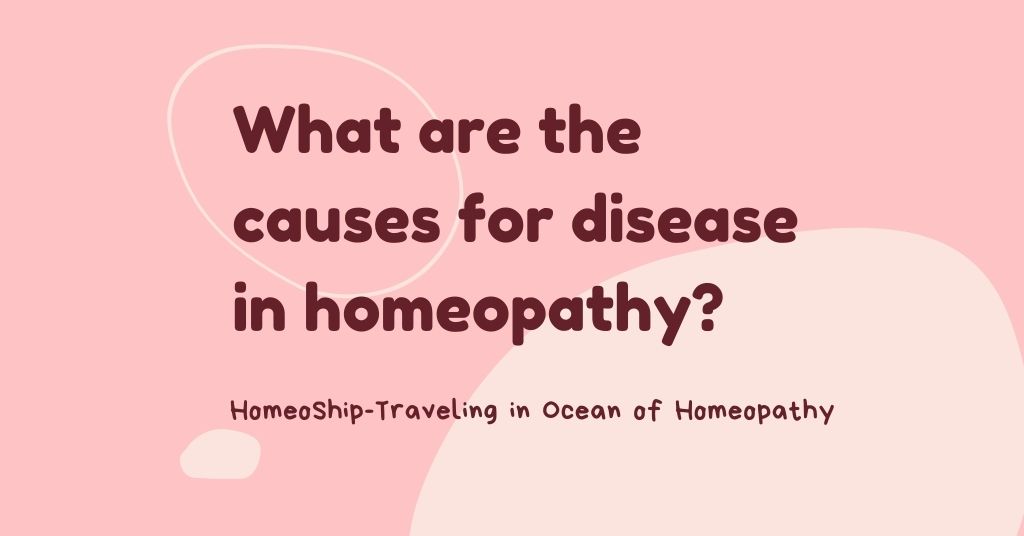According to modern medicine, the cause of the diseases is various kind of pathogenic agents but according to homeopathy, there are 3 different types of the cause which ultimately lead to disease.
- Exciting Cause
- Fundamental Cause
- Maintaining Cause

Let’s under each cause in detail.
-
Exciting Cause
The exciting cause can be defined as the cause that excites and brings about acute sufferings in a chronic case.” Identifying the exciting cause is the most important step in treating acute diseases.
During the case-taking process, if a patient says “since then” or “since that incidence I am not feeling well”, the physician has to consider that cause as the exciting cause that brought about this acute disease.
For example: if a patient says, “last night I drenched myself in rain, since then I am having this running nose.” Then it is clear that in this case “drenching in rain” acted as an “exciting cause” and caused acute disease.
Knowledge of materia medica helps us in prescribing a remedy “Rhus tox” to that patient now.
The exciting cause cannot trouble the patient unless the person is affected by the fundamental cause. So as a conclusion, acute diseases are nothing but the temporary explosion of the fundamental cause “psora” because of the exciting cause.
Types of Exciting Cause
Exciting causes can be of various types. Fear, trauma, exposure to excess cold or heat, excessive eating may also act as the exciting cause.
But basically, they can be classified into 4 types:
- Physical exciting causes: Physical and environmental conditions come under this heading. Like exposure to excess heat or cold, thunderstorms, intake of excess or lack of food, etc.
- Mechanical exciting cause: Damages caused by physical trauma comes under this heading. Example: injuries, accidents, burn and insect bites, etc.
- Nervous exciting cause: Psychological reasons like fear, shock, jealousy, grief and overjoy, etc all under this category.
- Hygienic exciting causes: Food poisoning, pollution, and lack of personal and social hygiene come in this group.
Therapeutic Uses of Exciting Cause:
The exciting cause is useful in:
- Selecting a remedy: In acute diseases, the exciting cause indicates the remedy to the patient’s condition. For example: if a patient says “since that head injury I am not feeling well”; a homeopath will usually think of a Natrium sulph. , the final selection depends upon the other symptoms of the patient.
- In the prevention of diseases: By identifying the exciting cause that causes the disease in the patient, the physician can advise the patient to protect himself from exposure to such an exciting cause in the future.
- If acute disease: is not of a severe character, just by avoiding the exciting causes alone one can relieve the patient.
2. Fundamental Cause
The “Fundamental cause” is the cause of chronic diseases. The real fundamental cause of all diseases is “Miasm”.
In his early days of homeopathic practice Hahnemann noticed that despite careful prescriptions, chronic diseases were not yielding to homeopathic medicines, whereas acute diseases were conquered by homeopathic medicines perfectly. After 12 years of practice and research, Hahnemann found the “miasms” to be the cause for this failure. He called the miasms the most fundamental cause or the real cause of diseases.
In the year 1828, he published his findings in the book, “The Chronic Diseases, Their Cause and Cure”. Further, he incorporated this theory of chronic disease in the 4th edition of Organon in the year 1829.
“Miasms are dynamic, morbific forces that pollute the human organism leading to unhealthy tendencies and different diseases.” The word “Miasm” is derived from the Greek word “miasmein”. A similar Latin word “miasma” is also identified. The meaning of which is pollution, stigma, etc.
Miasms are hidden in every person on this earth. They can be carried from one generation to the other generation. These miasms can be acquired during one’s lifetime. Because of miasm, persons are prone to various types of diseases. Miasms develop a susceptibility to diseases in each individual.
Also Read:
- Samuel Hahnemann – Rags to Riches (1755-1843)
- Who can treat Judiciary & Rationally? Knowledge of the Physician/
- 7 Cardinal Principles of Homeopathy
3. Maintaining Cause
To know about Maintaining Cause read our Causa occasionalis post.
Thank you for reading this, enjoyed our content. If you have any doubt regarding homeopathy you can always comment below or ask questions on Quora.

